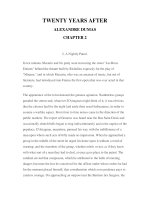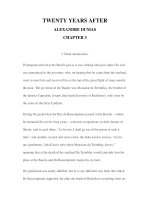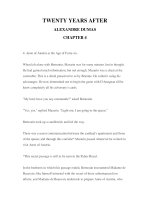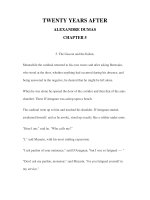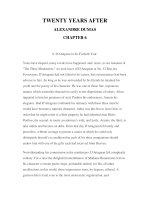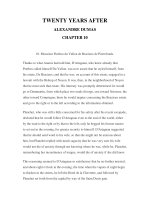LUYỆN ĐỌC TIẾNG ANH QUA CÁC TÁC PHẨM VĂN HỌC –TWENTY YEARS AFTER ALEXANDRE DUMAS CHAPTER 29 doc
Bạn đang xem bản rút gọn của tài liệu. Xem và tải ngay bản đầy đủ của tài liệu tại đây (856.84 KB, 15 trang )
TWENTY YEARS AFTER
ALEXANDRE DUMAS
CHAPTER 29
29. The Ferry across the Oise.
We hope that the reader has not quite forgotten the young traveler whom we left
on the road to Flanders.
In losing sight of his guardian, whom he had quitted, gazing after him in front of
the royal basilican, Raoul spurred on his horse, in order not only to escape from
his own melancholy reflections, but also to hide from Olivain the emotion his
face might betray.
One hour's rapid progress, however, sufficed to disperse the gloomy fancies that
had clouded the young man's bright anticipations; and the hitherto unfelt
pleasure of freedom a pleasure which is sweet even to those who have never
known dependence seemed to Raoul to gild not only Heaven and earth, but
especially that blue but dim horizon of life we call the future.
Nevertheless, after several attempts at conversation with Olivain he foresaw that
many days passed thus would prove exceedingly dull; and the count's agreeable
voice, his gentle and persuasive eloquence, recurred to his mind at the various
towns through which they journeyed and about which he had no longer any one
to give him those interesting details which he would have drawn from Athos,
the most amusing and the best informed of guides. Another recollection
contributed also to sadden Raoul: on their arrival at Sonores he had perceived,
hidden behind a screen of poplars, a little chateau which so vividly recalled that
of La Valliere to his mind that he halted for nearly ten minutes to gaze at it, and
resumed his journey with a sigh too abstracted even to reply to Olivain's
respectful inquiry about the cause of so much fixed attention. The aspect of
external objects is often a mysterious guide communicating with the fibres of
memory, which in spite of us will arouse them at times; this thread, like that of
Ariadne, when once unraveled will conduct one through a labyrinth of thought,
in which one loses one's self in endeavoring to follow that phantom of the past
which is called recollection.
Now the sight of this chateau had taken Raoul back fifty leagues westward and
had caused him to review his life from the moment when he had taken leave of
little Louise to that in which he had seen her for the first time; and every branch
of oak, every gilded weathercock on roof of slates, reminded him that, instead
of returning to the friends of his childhood, every instant estranged him further
and that perhaps he had even left them forever.
With a full heart and burning head he desired Olivain to lead on the horses to a
wayside inn, which he observed within gunshot range, a little in advance of the
place they had reached.
As for himself, he dismounted and remained under a beautiful group of
chestnuts in flower, amidst which were murmuring a multitude of happy bees,
and bade Olivain send the host to him with writing paper and ink, to be placed
on a table which he found there, conveniently ready. Olivain obeyed and
continued on his way, whilst Raoul remained sitting, with his elbow leaning on
the table, from time to time gently shaking the flowers from his head, which fell
upon him like snow, and gazing vaguely on the charming landscape spread out
before him, dotted over with green fields and groups of trees. Raoul had been
there about ten minutes, during five of which he was lost in reverie, when there
appeared within the circle comprised in his rolling gaze a man with a rubicund
face, who, with a napkin around his body, another under his arm, and a white
cap upon his head, approached him, holding paper, pen and ink in hand.
"Ha! ha!" laughed the apparition, "every gentleman seems to have the same
fancy, for not a quarter of an hour ago a young lad, well mounted like you, as
tall as you and of about your age, halted before this clump of trees and had this
table and this chair brought here, and dined here, with an old gentleman who
seemed to be his tutor, upon a pie, of which they haven't left a mouthful, and
two bottles of Macon wine, of which they haven't left a drop, but fortunately we
have still some of the same wine and some of the same pies left, and if your
worship will but give your orders "
"No, friend " replied Raoul, smiling, "I am obliged to you, but at this moment I
want nothing but the things for which I have asked only I shall be very glad if
the ink prove black and the pen good; upon these conditions I will pay for the
pen the price of the bottle, and for the ink the price of the pie."
"Very well, sir," said the host, "I'll give the pie and the bottle of wine to your
servant, and in this way you will have the pen and ink into the bargain."
"Do as you like," said Raoul, who was beginning his apprenticeship with that
particular class of society, who, when there were robbers on the highroads, were
connected with them, and who, since highwaymen no longer exist, have
advantageously and aptly filled their vacant place.
The host, his mind at ease about his bill, placed pen, ink and paper upon the
table. By a lucky chance the pen was tolerably good and Raoul began to write.
The host remained standing in front of him, looking with a kind of involuntary
admiration at his handsome face, combining both gravity and sweetness of
expression. Beauty has always been and always will be all-powerful.
"He's not a guest like the other one here just now," observed mine host to
Olivain, who had rejoined his master to see if he wanted anything, "and your
young master has no appetite."
"My master had appetite enough three days ago, but what can one do? he lost it
the day before yesterday."
And Olivain and the host took their way together toward the inn, Olivain,
according to the custom of serving-men well pleased with their place, relating to
the tavern-keeper all that he could say in favor of the young gentleman; whilst
Raoul wrote on thus:
"Sir, After a four hours' march I stop to write to you, for I miss you every
moment, and I am always on the point of turning my head as if to reply when
you speak to me. I was so bewildered by your departure and so overcome with
grief at our separation, that I am sure I was able to but very feebly express all
the affection and gratitude I feel toward you. You will forgive me, sir, for your
heart is of such a generous nature that you can well understand all that has
passed in mine. I entreat you to write to me, for you form a part of my
existence, and, if I may venture to tell you so, I also feel anxious. It seemed to
me as if you were yourself preparing for some dangerous undertaking, about
which I did not dare to question you, since you told me nothing. I have,
therefore, as you see, great need of hearing from you. Now that you are no
longer beside me I am afraid every moment of erring. You sustained me
powerfully, sir, and I protest to you that to-day I feel very lonely. Will you have
the goodness, sir, should you receive news from Blois, to send me a few lines
about my little friend Mademoiselle de la Valliere, about whose health, when
we left, so much anxiety was felt? You can understand, honored and dear
guardian, how precious and indispensable to me is the remembrance of the years
that I have passed with you. I hope that you will sometimes, too, think of me,
and if at certain hours you should miss me, if you should feel any slight regret at
my absence, I shall be overwhelmed with joy at the thought that you appreciate
my affection for and my devotion to yourself, and that I have been able to prove
them to you whilst I had the happiness of diving with you."
After finishing this letter Raoul felt more composed; he looked well around him
to see if Olivain and the host might not be watching him, whilst he impressed a
kiss upon the paper, a mute and touching caress, which the heart of Athos might
well divine on opening the letter.
During this time Olivain had finished his bottle and eaten his pie; the horses
were also refreshed. Raoul motioned to the host to approach, threw a crown
upon the table, mounted his horse, and posted his letter at Senlis. The rest that
had been thus afforded to men and horses enabled them to continue their
journey at a good round pace. At Verberie, Raoul desired Olivain to make some
inquiry about the young man who was preceding them; he had been observed to
pass only three-quarters of an hour previously, but he was well mounted, as the
tavern-keeper had already said, and rode at a rapid pace.
"Let us try and overtake this gentleman," said Raoul to Olivain; "like ourselves
he is on his way to join the army and may prove agreeable company."
It was about four o'clock in the afternoon when Raoul arrived at Compiegne;
there he dined heartily and again inquired about the young gentleman who was
in advance of them. He had stopped, like Raoul, at the Hotel of the Bell and
Bottle, the best at Compiegne; and had started again on his journey, saying that
he should sleep at Noyon.
"Well, let us sleep at Noyon," said Raoul.
"Sir," replied Olivain, respectfully, "allow me to remark that we have already
much fatigued the horses this morning. I think it would be well to sleep here and
to start again very early to-morrow. Eighteen leagues is enough for the first
stage."
"The Comte de la Fere wished me to hasten on," replied Raoul, "that I might
rejoin the prince on the morning of the fourth day; let us push on, then, to
Noyon; it will be a stage similar to those we traveled from Blois to Paris. We
shall arrive at eight o'clock. The horses will have a long night's rest, and at five
o'clock to-morrow morning we can be again on the road."
Olivain dared offer no opposition to this determination but he followed his
master, grumbling.
"Go on, go on," said he, between his teeth, "expend your ardor the first day; to-
morrow, instead of journeying twenty leagues, you will travel ten, the day after
to-morrow, five, and in three days you will be in bed. There you must rest;
young people are such braggarts."
It was easy to see that Olivain had not been taught in the school of the Planchets
and the Grimauds. Raoul really felt tired, but he was desirous of testing his
strength, and, brought up in the principles of Athos and certain of having heard
him speak a thousand times of stages of twenty-five leagues, he did not wish to
fall far short of his model. D'Artagnan, that man of iron, who seemed to be
made of nerve and muscle only, had struck him with admiration. Therefore, in
spite of Olivain's remarks, he continued to urge his steed more and more, and
following a pleasant little path, leading to a ferry, and which he had been
assured shortened the journey by the distance of one league, he arrived at the
summit of a hill and perceived the river flowing before him. A little troop of
men on horseback were waiting on the edge of the stream, ready to embark.
Raoul did not doubt this was the gentleman and his escort; he called out to him,
but they were too distant to be heard; then, in spite of the weariness of his beast,
he made it gallop but the rising ground soon deprived him of all sight of the
travelers, and when he had again attained a new height, the ferryboat had left
the shore and was making for the opposite bank. Raoul, seeing that he could not
arrive in time to cross the ferry with the travelers, halted to wait for Olivain. At
this moment a shriek was heard that seemed to come from the river. Raoul
turned toward the side whence the cry had sounded, and shaded his eyes from
the glare of the setting sun with his hand.
"Olivain!" he exclaimed, "what do I see below there?"
A second scream, more piercing than the first, now sounded.
"Oh, sir!" cried Olivain, "the rope which holds the ferryboat has broken and the
boat is drifting. But what do I see in the water something struggling?"
"Oh, yes," exclaimed Raoul, fixing his glance on one point in the stream,
splendidly illumined by the setting sun, "a horse, a rider!"
"They are sinking!" cried Olivain in his turn.
It was true, and Raoul was convinced that some accident had happened and that
a man was drowning; he gave his horse its head, struck his spurs into its sides,
and the animal, urged by pain and feeling that he had space open before him,
bounded over a kind of paling which inclosed the landing place, and fell into the
river, scattering to a distance waves of white froth.
"Ah, sir!" cried Olivain, "what are you doing? Good God!"
Raoul was directing his horse toward the unhappy man in danger. This was, in
fact, a custom familiar to him. Having been brought up on the banks of the
Loire, he might have been said to have been cradled on its waves; a hundred
times he had crossed it on horseback, a thousand times had swum across. Athos,
foreseeing the period when he should make a soldier of the viscount, had inured
him to all kinds of arduous undertakings.
"Oh, heavens!" continued Olivain, in despair, "what would the count say if he
only saw you now!"
"The count would do as I do," replied Raoul, urging his horse vigorously
forward.
"But I but I," cried Olivain, pale and disconsolate rushing about on the shore,
"how shall I cross?"
"Leap, coward!" cried Raoul, swimming on; then addressing the traveler, who
was struggling twenty yards in front of him: "Courage, sir!" said he, "courage!
we are coming to your aid."
Olivain advanced, retired, then made his horse rear turned it and then, struck
to the core by shame, leaped, as Raoul had done, only repeating:
"I am a dead man! we are lost!"
In the meantime, the ferryboat had floated away, carried down by the stream,
and the shrieks of those whom it contained resounded more and more. A man
with gray hair had thrown himself from the boat into the river and was
swimming vigorously toward the person who was drowning; but being obliged
to go against the current he advanced but slowly. Raoul continued his way and
was visibly gaining ground; but the horse and its rider, of whom he did not lose
sight, were evidently sinking. The nostrils of the horse were no longer above
water, and the rider, who had lost the reins in struggling, fell with his head back
and his arms extended. One moment longer and all would disappear.
"Courage!" cried Raoul, "courage!"
"Too late!" murmured the young man, "too late!"
The water closed above his head and stifled his voice.
Raoul sprang from his horse, to which he left the charge of its own preservation,
and in three or four strokes was at the gentleman's side; he seized the horse at
once by the curb and raised its head above water; the animal began to breathe
again and, as if he comprehended that they had come to his aid, redoubled his
efforts. Raoul at the same time seized one of the young man's hands and placed
it on the mane, which it grasped with the tenacity of a drowning man. Thus, sure
that the rider would not release his hold, Raoul now only directed his attention
to the horse, which he guided to the opposite bank, helping it to cut through the
water and encouraging it with words.
All at once the horse stumbled against a ridge and then placed its foot on the
sand.
"Saved!" exclaimed the man with gray hair, who also touched bottom.
"Saved!" mechanically repeated the young gentleman, releasing the mane and
sliding from the saddle into Raoul's arms; Raoul was but ten yards from the
shore; there he bore the fainting man, and laying him down upon the grass,
unfastened the buttons of his collar and unhooked his doublet. A moment later
the gray-headed man was beside him. Olivain managed in his turn to land, after
crossing himself repeatedly; and the people in the ferryboat guided themselves
as well as they were able toward the bank, with the aid of a pole which chanced
to be in the boat.
Thanks to the attentions of Raoul and the man who accompanied the young
gentleman, the color gradually returned to the pale cheeks of the dying man,
who opened his eyes, at first entirely bewildered, but who soon fixed his gaze
upon the person who had saved him.
"Ah, sir," he exclaimed, "it was you! Without you I was a dead man thrice
dead."
"But one recovers, sir, as you perceive," replied Raoul, "and we have but had a
little bath."
"Oh! sir, what gratitude I feel!" exclaimed the man with gray hair.
"Ah, there you are, my good D'Arminges; I have given you a great fright, have I
not? but it is your own fault. You were my tutor, why did you not teach me to
swim?"
"Oh, monsieur le comte," replied the old man, "had any misfortune happened to
you, I should never have dared to show myself to the marshal again."
"But how did the accident happen?" asked Raoul.
"Oh, sir, in the most natural way possible," replied he to whom they had given
the title of count. "We were about a third of the way across the river when the
cord of the ferryboat broke. Alarmed by the cries and gestures of the boatmen,
my horse sprang into the water. I cannot swim, and dared not throw myself into
the river. Instead of aiding the movements of my horse, I paralyzed them; and I
was just going to drown myself with the best grace in the world, when you
arrived just in time to pull me out of the water; therefore, sir, if you will agree,
henceforward we are friends until death."
"Sir," replied Raoul, bowing, "I am entirely at your service, I assure you."
"I am called the Count de Guiche," continued the young man; "my father is the
Marechal de Grammont; and now that you know who I am, do me the honor to
inform me who you are."
"I am the Viscount de Bragelonne," answered Raoul, blushing at being unable
to name his father, as the Count de Guiche had done.
"Viscount, your countenance, your goodness and your courage incline me
toward you; my gratitude is already due. Shake hands I crave your
friendship."
"Sir," said Raoul, returning the count's pressure of the hand, "I like you already,
from my heart; pray regard me as a devoted friend, I beseech you."
And now, where are you going, viscount?" inquired De Guiche.
"To join the army, under the prince, count."
"And I, too!" exclaimed the young man, in a transport of joy. "Oh, so much the
better, we will fire the first shot together."
"It is well; be friends," said the tutor; "young as you both are, you were perhaps
born under the same star and were destined to meet. And now," continued he,
"you must change your clothes; your servants, to whom I gave directions the
moment they had left the ferryboat, ought to be already at the inn. Linen and
wine are both being warmed; come."
The young men had no objection to this proposition; on the contrary, they
thought it very timely.
They mounted again at once, whilst looks of admiration passed between them.
They were indeed two elegant horsemen, with figures slight and upright, noble
faces, bright and proud looks, loyal and intelligent smiles.
De Guiche might have been about eighteen years of age, but he was scarcely
taller than Raoul, who was only fifteen.

